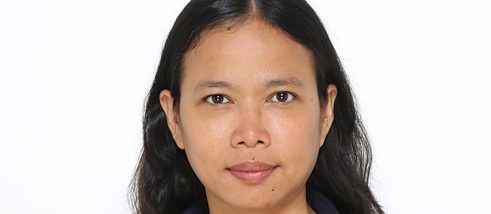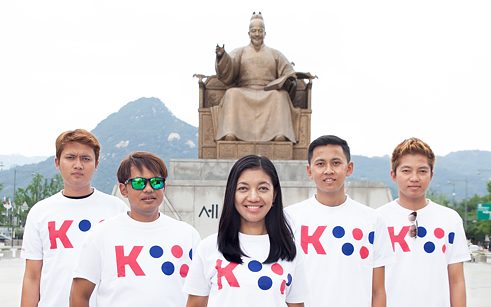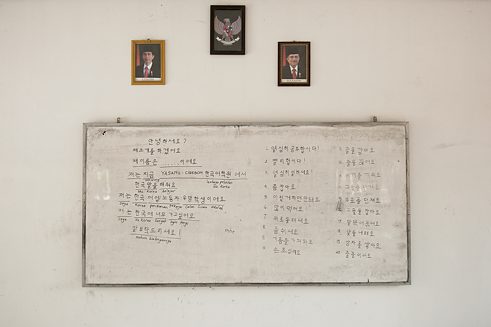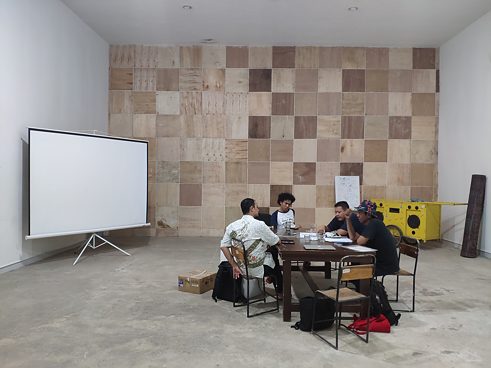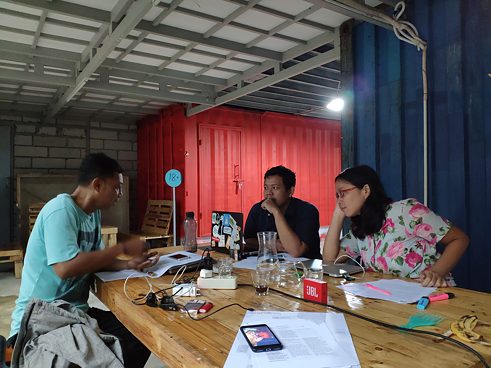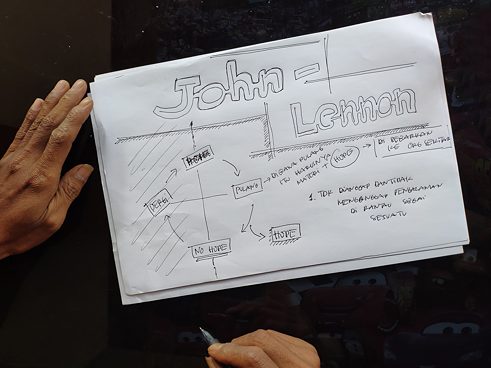Julia Sarisetiati
Jakarta, Indonesia
Julia Sarisetiati was born in Jakarta in 1981, and graduated from the Arts and Design Faculty of Trisakti University with a degree in photography. She is part of ruangrupa, an artist collective established in 2000 in Jakarta that now co-runs Gudskul, an informal educational platform for art practitioners, in which Sari teaches a course titled ’Collective Sustainability‘. A major focus of her artistic practice is the ecosystem of the Indonesian migrant workforce and the sustainability thereof.
Recent exhibitions includes TACTICS (Jakarta Biennale, 2013); Hacking Urban Reality Series, (Copenhagen, 2016); the 11th Gwangju Biennale, Korea (2016); We’re in this, together (The Factory Contemporary Art Space, Saigon, 2018); and Choreographed Knowledges (Cemeti Institute for Art and Society, Yogyakarta, 2019). In 2017, she became a curator for the media art festival OK.Video, exhibiting works on the theme of ‘pangan’ (food), which developed ideas into laboratory-based research projects to demonstrate and explore their economic and social sustainability.
“PULANG-PERGI (ROUND TRIP)” and “Indo K-Work”
Developed in 2016, Indo K-Work is the result of a collaboration between the fellows of Indonesia Community Center in Ansan, South Korea—Diko, Hanum Putra Martono, Muhammad Abduh, Sujianto and Raden Mas Ulung—with several artists from Indonesia: Julia Sarisetiati, Ary Sendy, Liemena Sapriya Putra, Yoppie Adhijaya and Muhammad Fatchurofi. Through Indo K-Work, they invite Indonesian workers to collectively accumulate/produce knowledge from work and migration activities, at the same time enabling them to play an active part as agents distributing this knowledge to others.
Inspired by this, in 2019 some of the artists who had joined the project decided to start developing PULANG-PERGI (ROUND TRIP), an online platform for knowledge-sharing amongst Indonesian migrant workers, both those who are currently abroad and those who have returned home. The platform takes its name(s) from the world of aviation, ‘round trip’ being the nearest English translation for the Indonesian phrase ‘pulang-pergi’. In collaboration with Teguh Safarizal (designer), Riza (technologist), Ube Dwi Suryasumirat (visual artist), Deasy Elsara (copywriter), Ary Sendy, Nissal Nur Afryansah and Liemena Sapriya Putra (filmmakers) and Budi Mulia (a researcher in translation and education), Sarisetiati has developed this platform to focus on the multitude of practices related to bottom-up economic reintegration. This bottom-up knowledge is particular and difficult to formalize, depending as it does on specific geographical, environmental, social, and political contexts; the platform is also an attempt to answer the question as to whether it is possible to codify tacit knowledge into a form that permits transfer and translation.
Leaving and/or returning is practically a certainty within the life cycle of low-skilled workers in Indonesia. As the sustainability of reintegration, whether it be at home or in a migrant worker’s destination country, is not guaranteed, migration poses a challenge both to the workers themselves and the broader community. Only very recently, in 2010, has the Indonesian government started actively focusing on reintegration to their home communities (both socially and economically); however, returnees still often have little knowledge of state-led initiatives, and only a small portion of returnees have successfully (economically) reintegrated in their respective regions. Their bottom-up knowledge and experiences are valuable to share with other migrant workers: those who, for example, are currently still abroad. PULANG-PERGI will be a platform through which previously un-codified knowledge can be articulated, accumulated and distributed, rendering it transferable, and initiating an endless dialogue among those who are abroad and those who have returned.
Indo K-Work will be presented in the Ulaanbaatar International Media Festival and PULANG-PERGI will be introduced in the project exhibition in Gwangju.
